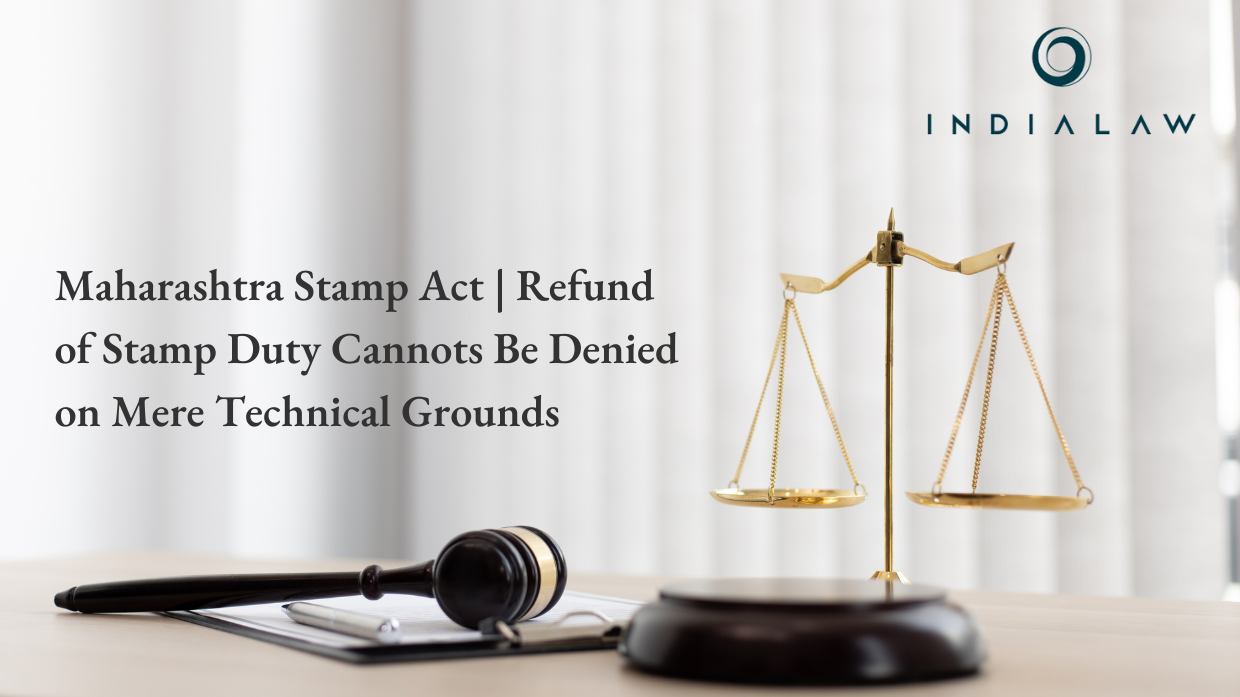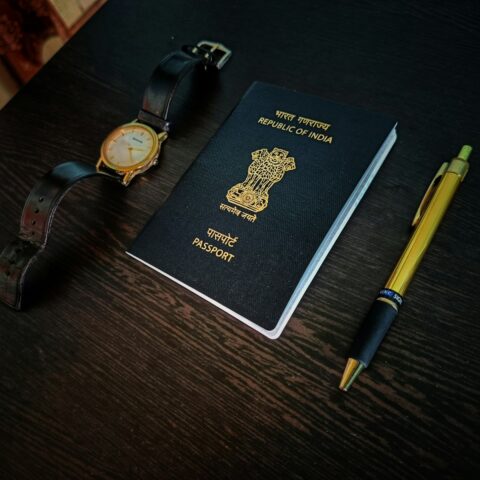Maharashtra Stamp Act | Refund of Stamp Duty Cannot Be Denied on Mere Technical Grounds

The Hon’ble Supreme Court (“SC”), in a recent decision[i], upheld and relayed an observation made in its earlier decision of Committee-GFIL v. Libra Buildtech Private Limited & Ors.[ii], wherein the Hon’ble SC observed that:
“19. … we have often had occasion to say that when the State deals with a citizen it should not ordinarily rely on technicalities, and if the State is satisfied that the case of the citizen is a just one, even though legal defences may be open to it, it must act, as has been said by eminent Judges, as an honest person.”.
With the aforesaid observation in mind, lets divulge into the facts of the present case:
Facts of the Case:
The particulars in this case were that, a purchaser had agreed to purchase a piece and parcel of land from the vendor and for the very purpose, they the purchaser and the vendor entered into a conveyance deed, which was sent for adjudication on 07th May 2014 to ascertain the quantum of stamp duty. The stamp duty was assessed at Rs.25,34,350 (Rupees Twenty-Five Lakhs Thirty Four Thousand Three Hundred Fifty Only). Accordingly, the Appellant paid this sum and purchased the stamp duty on 13th May 2014 for registration of conveyance deed as mutually agreed upon. The purchaser had also given a public notice thereby inviting objections about the aforesaid transaction; however, she did not receive any objections pursuant to the said public notice.
The purchaser pursuant to its due diligence exercise, found out that the said piece and parcel of land under consideration, was previously sold by the vendor in the year 1992. It was after the discovery of this fraud and deception; the purchaser decided to cancel the transaction and filed an application for refund of stamp duty on 22nd October 2014.
In the meantime, the purchaser made efforts to communicate with the vendor to execute a cancellation deed. Thereafter, due to intervention of the Police, the vendor could be traced, and a cancellation deed was executed on 13th November 2014. The purchaser after the execution of the said cancellation deed, filed written application on 06th December 2014, along with the documents, for refund of the stamp duty paid.
The purchaser’s case was rejected by Chief Controlling Revenue Authority and Inspector General of registration and Controller of Stamps & Collector of Stamps (“authorities”), vide orders dated 09th June 2015 & 25th February 2016, on the ground that the application filed by her was beyond the limitation period as per Section 48 of the Maharashtra Stamp Act, 1958 (“Act”).
The purchaser then approached the Hon’ble High Court, Bombay (“
HC”) invoking its writ jurisdiction, against the said orders passed by said authorities. The Hon’ble High Court, Bombay, vide its order dated 02nd August 2019 (“Impugned Order”), dismissed the purchaser’s demand for refund of Stamp Duty paid towards an un-executed conveyance deed and in effect upheld the said order of the Respondent Nos. 1 & 2”.
Before, going further and for the sake of convenience, the purchaser is hereinafter referred to as “Appellant” and the said authorities are hereinafter referred to as “Respondent Nos. 1 & 2”, respectively. It was against the said Impugned order, the purchaser had filed Special Leave Petitions (“SLP”), before the Hon’ble SC.
Brief Submissions:
The Ld. Counsel appearing on behalf of the purchaser argued that, purchasers’ case is squarely covered within the circumstances laid down in Section 47 (c) [1] and [5] of the Act and Rules 21 and 22A of the Bombay Stamp Rules, 1939 (“Rules”). The law of refund embodied in Sections 47 and 48 of the Act and Rules 21 and 22A of the Rules, envisages two separate and distinct stages for refund of stamp duty i.e.,
- Making of application for refund within six months, and,
- Holding of enquiry and leading of evidence as per the Rules made by the State Government,
to satisfy the Collector that case of refund is covered by one or more of the circumstances (a) (b) and (c) [1] to [8] set out in Section 47 of the Act. He further submitted that the Respondent No.2 and the Hon’ble High Court, Bombay, has erred and overlooked the said provisions and the refund application of the appellant was within limitation.
The Ld. Counsel appearing on behalf of the respondents argued that, the appellant filed application for refund of stamp duty on 22.10.2014, but the cancellation deed executed between the appellant and the seller of the said property was dated 13th November 2014 i.e., beyond the limitation period of six months from the date of purchase of stamp duty, after cancellation of those documents, as prescribed under Section 48 of the Act.
Court’s Finding:
After hearing the counsels, the Hon’ble SC opined that; in view of the above admitted facts, prima facie it appears that the appellant herein was pursuing her remedies in law and she was not lax in her approach towards seeking refund of the said stamp duty paid by her and she has been denied the same only on the ground of limitation.
The Hon’ble SC in the present case observed that the finding delivered by the High Court in the impugned order that the appellant’s application for refund dated 22nd October 2014 is not maintainable in law as it has been filed before the cancellation of the conveyance deed dated 13th November 2014 is improper in so far as while submitting the online application there was no caution to the appellant that all of the documents and materials for the satisfaction of the Collector should be filed with the application- either online or hard copy- itself and the finding of the learned single judge is contrary to the requirements stipulated by Sections 47 & 48 of the Act which envisages only the application for relief under Section 47 of the Act to be made within six months of the date of the instrument which prima facie is appeared to have been done by the appellant in the present case.
The Hon’ble SC, drawing weight from the Judgment of Committee-GFIL(supra), reiterated the settled law that the period of expiry of limitation prescribed under any law may bar the remedy but not the right. Therefore, the Appellant should not be denied the said refund merely on technicalities as the case of the appellant is a just one wherein, she had in bonafide paid the stamp duty for registration but fraud was played on her by the Vendor which led to the cancellation of the conveyance deed and the appeal was allowed with a direction to the Respondents to refund the stamp duty paid.
The authors are of the opinion that State and authorities wielding power under the State should ensure that, as far as possible, any application made within the prescribed limitation are adjudicated on merits. In cases involving delay in refund requests, authorities should prioritize the merits of the case over strict technicalities. It is crucial to consider the circumstances that led to the delay and whether the person acted in good faith or not. Denying refunds solely on technical grounds without assessing the merits can be unjust and hinder fair outcomes.
[i] Bano Saiyed Parwaz vs Chief Controlling Revenue Authority and Inspector General of Registration and Controller of Stamps and Ors. – 2024 SCC OnLine SC 979.
[ii] (2015) 16 SCC 31.
By entering the email address you agree to our Privacy Policy.



